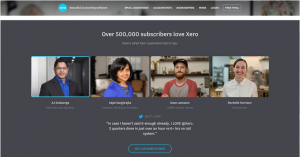by Gord Hotchkiss, Oct 23, 2014
IAB Canada President Chris Williams asked me a great question last week.
We had just finished presenting the results of the new eye tracking study I told you about in my last three columns. I had mentioned that about 84% of all the clicks on the page in the study were on some type of nonpaid result. I had also polled the audience of some 400-plus Internet marketers about how many were doing some type of organic optimization. A smattering of hands (which, in case you’re wondering, is somewhere south of a dozen, or about 3% of the audience) went up.
Williams picked up on the disconnect right away. “We have a multibillion-dollar interactive advertising industry here in Canada, and you’re telling me [on search at least] that only represents about 16% of the potential traffic? Why isn’t SEO a massive industry?”
As I said — great question. I wish I had responded with a great answer. But the best I could do fell well short of the mark: “Uhh..well…[pick up slight whining tone at this point] SEO is just really, really hard!”
OK, maybe I was slightly more eloquent than that, but the substance of my reply was essentially that flimsy. SEO is a backbreaking way to earn a living, whether you’re a lone consultant, an agency, or an in-house marketer.
Coincidentally, I was also in an inaugural call last week with a dear friend of mine who asked me to serve on the advisory board of his successful digital agency. I asked if the agency offered SEO services. I got the same answer: SEO was just too hard to make it profitable. The company dropped SEO a few years ago from its services portfolio.
It Was a Case of Showing Search the Money
The potential value of SEO hasn’t changed in the almost 20 years since I started in this biz. In fact, it’s probably greater than ever. But SEO never seems to gain traction. The reason becomes clear when you start following the money. Goto.com (which became Overture, which was swallowed by Yahoo) sealed SEO’s fate when it started auctioning off search ads in 1998. Google eventually followed suit in 2000 — and the rest, along with SEO, was history.
Even devout SEOers (myself included) eventually followed the money trail to the paid side of the house. The reasons why were abundantly and painfully clear when you consider this one particular example. We had the SEO contract for one fFortune 500 brand that brought in about $300K annually. At the time, it would have been our biggest SEO contract, but it was also resource-intensive. We had an entire team working on it. We did well, securing a number of first-page results for some very high-traffic terms. Based on what analytics we had, it appeared that SEO was driving about 90% of the traffic and was converting substantially better than any other traffic source, including paid search. This translated into hundreds of millions of dollars in business yearly. But we could never seem to grow our contract beyond that $300K ceiling.
Paid search was another story. From fairly humble beginnings, that same brand became one of Google’s top advertisers, spending over $30 million per year. The management of that contract became a multimillion-dollar account. Unfortunately, it wasn’t our account. It belonged to another agency — a much smarter and more profitable agency.
Why We Got Pigeon-Holed with SEO
If, as a service provider, you live and die by SEO, it’s probable that you’ll end up dying by SEO. Here’s why. To gain any traction, you need to have influence over almost every aspect of the business. SEO has to become systemic. It has to be baked into the way an organization does business. It can’t be done as window dressing.
Most organizations don’t get that. They get tantalized by initial easy wins: things like cleaning up code, improving crawlability and doing some basic content optimization. Organic traffic skyrockets and everyone cheers. Life is good. But then it gets hard. The next step means rolling up your sleeves and diving deep into the guts of the organization. And if that organization isn’t ready to open the kimono to the SEO consultant at all levels, you hit a brick wall. This is typically where the organization falls prey to more unscrupulous SEO promises and practices from other vendors, which invariably get slammed by a future algo-update. And that brings us to the last challenge for SEO.
Flip Your SEO Coin
Even the best SEOers can get blindsided by Google. A tweak in an algorithm or a shift in ranking factors can drop you like a rock from the first page. And, if the recent study showed anything, it was that you can’t afford to drop from the first page. Traffic can go from a roar to a whisper overnight. That’s tough for the marketing department of an organization to swallow. People in the C-Suite that sign off on a sizable SEO contract have a tough time understanding why their investment suddenly got flushed down Google’s drain, perhaps never to resurface. They love control, and SEO offers anything but. As important as SEO is, it’s not predictable. You can’t bank on it.
So, Chris, thanks for the question. As I said, it was a really good one. And I hope this is a little better answer than the one I came up with on the spot.
(253)



